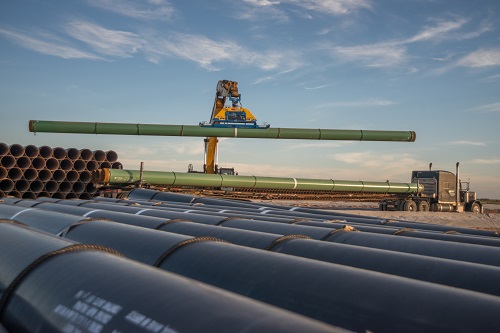Pipeline Shippers Challenge Plains' Steel Tariff Surcharge
HOUSTON (Reuters) - Two U.S. shale producers have challenged Plains All American Pipeline's proposed Cactus II surcharge for the 25% tariff on imported steel, raising the stakes for pipeline builders facing higher construction costs.
The United States imposed tariffs on imported steel and aluminum last year to shield U.S. producers from overseas competition. U.S. energy industry trade groups have warned the tariffs could raise costs for companies and consumers.
ConocoPhillips and a unit of Canadian producer Encana Corp on Monday asked the Federal Energy Regulatory Commission (FERC) to reject Plains' proposed tariff surcharge on its Cactus II oil pipeline, according to a regulatory filing.
Houston-based Plains this month proposed charging shippers a 5 cents-per-barrel fee on its 670,000 bpd Cactus II pipeline next April to offset higher construction costs due to the steel tariffs.
ConocoPhillips, Encana and Plains did not immediately respond to requests for comment.
In their filing, ConocoPhillips and Encana said Plains' surcharge was premature because the U.S. Commerce Department may still grant the pipeline operator an exemption before the fee goes into effect in April. The companies said surcharges "are generally disfavored" by FERC.
Plains last year estimated the steel tariff would add $40 million to its costs for the $1.1 billion pipeline, which runs 550 miles (885 km) from the Permian basin of West Texas and New Mexico, the top U.S. shale field, to the U.S. Gulf Coast.
The U.S. Commerce Department had rejected Plains' two initial requests for a waiver, and the company has filed a third request, a spokesman had said earlier this month.
Plains Chief Executive Officer Willie Chiang had said in a conference call the company would rebate the fee to shippers if the Commerce Department approved its exemption request.
Plains' Cactus II pipeline is one of three new oil pipelines to begin transporting shale oil this year from the Permian to the U.S. Gulf Coast. The startup has already begun to lift regional oil prices in West Texas that were depressed due to a shortage of capacity.
Two other energy pipeline operators also could raise their prices if Plains' surcharge sticks, analysts have said. They have pointed to Kinder Morgan's Gulf Coast Express, a natural gas pipeline, and an EPIC Midstream crude pipeline, which were constructed after the steel tariffs were levied.
Related News
Related News

- 1,000-Mile Pipeline Exit Plan by Hope Gas Alarms West Virginia Producers
- Valero Plans to Shut California Refinery, Takes $1.1 Billion Hit
- Three Killed, Two Injured in Accident at LNG Construction Site in Texas
- Greenpeace Ordered to Pay $667 Million to Energy Transfer Over Dakota Access Pipeline Protests
- Boardwalk’s Texas Gas Launches Open Season for 2 Bcf/d Marcellus-to-Louisiana Pipeline Expansion
- New Alternatives for Noise Reduction in Gas Pipelines
- Construction Begins on Ghana's $12 Billion Petroleum Hub, But Not Without Doubts
- Greenpeace Ordered to Pay $667 Million to Energy Transfer Over Dakota Access Pipeline Protests
- DOE Considers Cutting Over $1.2 Billion in Carbon Capture Project Funding
- Valero Plans to Shut California Refinery, Takes $1.1 Billion Hit





Comments